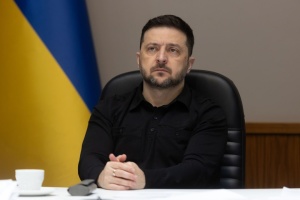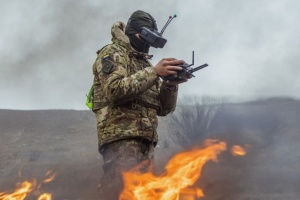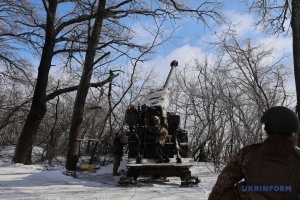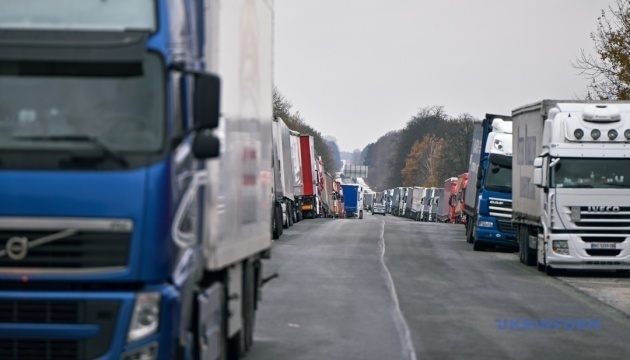
Blockade of border with Poland: it was planned by Moscow, we must overcome it together
For more than three weeks now, Polish carriers have been blocking the movement of freight transport to the Yagodyn-Dorogusk, Korchova-Krakivets, Hrebenne-Rava-Ruska, and, more recently, Medyka-Shehyni border crossing points with Ukraine.
Almost 3,000 trucks are currently waiting in lines. On average, a day of downtime, according to the European Business Association (EBA), costs one company about UAH 1 million in losses. Meanwhile, Volodymyr Balin, vice president of the Association of International Road Carriers, citing the Federation of Employers of Ukraine, said that Ukraine's economy has already suffered losses of more than €400 million.
However, the blockade threatens not only financial losses, but also the lives and health of Ukrainian carriers. According to their decision, the strikers are letting one truck per hour through, including humanitarian aid for Ukraine, fuel tanks, and cargoes with various components, such as Lancet proximity detectors, which is a blow to our country's defense capabilities. People have to wait up to 10 days to cross the border in queues that are several kilometers long in difficult conditions. Unfortunately, two Ukrainian drivers, aged 54 and 56, have already died in the line...
Kyiv is preparing to evacuate drivers from the blocked checkpoints, has sent an official note to Warsaw, and is also initiating the creation of an EU monitoring mission. But will this change anything, and is there a way out of this situation? Let's try to find the answer to these questions. But first, what are the reasons for the blockade? There are essentially two reasons: the first is economic, the second is sabotage and political (let's call it that).
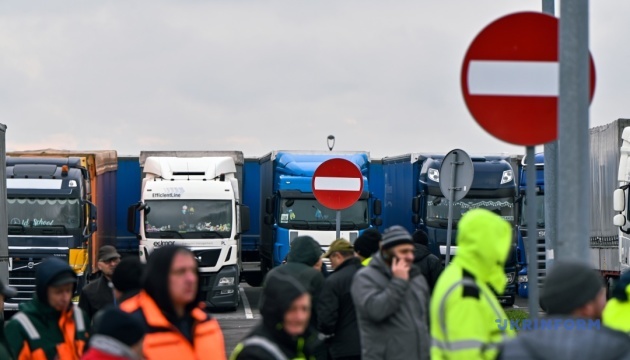
According to Oleh Pendzyn, an economic expert and member of the Economic Discussion Club, this problem arose because the pan-European transportation market has always been dominated by Polish carriers, but after receiving the so-called transport visa-free regime, Ukrainian carriers also began to enter the European market.
"Since the salary of a Polish driver is 3.5 times higher than that of a Ukrainian driver, Ukrainian companies began to actively take over intra-European transportation services, displacing Poles, Romanians, Hungarians, Slovaks, Czechs, and Lithuanians. Undoubtedly, this hits Polish carriers hard in the pocket. That is, we are not talking about transportation between Ukraine and Poland, but about the internal European transportation market, because it is a huge amount of money," the economist emphasizes.
In the same vein, entrepreneur Oleksii Davydenko, in his article titled "About Our Trucks and the Poles," recalls how in the 1990s, the main players in the Ukrainian and European trucking market were not Poles, but Germans, French, and Italians.
"Their trucks and their drivers carried most of the cargo throughout Europe. And they were the ones who made money on it. But in the 2000s, Polish carriers emerged, and with their low prices and better quality, they pushed out the drivers of old Europe. Because they were willing to work harder. Because they were willing to earn less. Because they wanted to live better. And the market chose them then, because the market always chooses the best," Davydenko writes.
However, back then, the French and Germans did not besiege Polish borders, block Polish trucks, or mock Polish drivers and consumers.
"We should not be silent about this. Because what the Poles are doing now with the blockade of Ukraine is not friendship or neighborly relations. Even without a war. Even if it were peaceful times. And it has nothing to do with a market economy and European values," the author emphasizes.
Davydenko emphasizes that due to Russia's armed aggression, the logistics infrastructure has suffered greatly - airports are closed, as are most seaports. In this regard, Ukraine was forced to look for an alternative. And this alternative was, in particular, the airports and seaports of Poland: "We pay port dues to the Poles, use their licensed and customs warehouses, often load into their airplanes and boost their economy. Two months ago, it cost €1500 to bring a container from Gdansk to Kyiv, and now it costs €6000. The Poles have blocked everything and actually put us under siege. But in reality... Our drivers and our carriers are Poles of the late 90s."
That is, they are just as hungry for work, ready to deliver faster and work cheaper. This is the market. And the market today chooses Ukrainians. But Ukrainians are not only refugees and not only entrepreneurs.
"Tens of thousands of ordinary Ukrainians work and pay taxes in Poland. Our citizens leave money at gas stations there, stay in their hotels, shop in their stores, eat in their restaurants, buy tickets for their trains, buses and airplanes. Stop hiding your eyes and being afraid to tell the truth. Our people are not parasites, not lepers," the blogger says.
"In fact, our citizens are raising Poland's economy through their work and their spending there. Therefore, we have every right to defend and receive the European values of equality and proportionality that our neighbors like to talk about so loudly: "And what they are doing to our drivers, to our exports and imports is definitely not friendly or neighborly relations," says Mr. Davydenko.
It's probably not possible to say better about the current situation. It is what is called a healthy, reasoned emotion and without "excesses". This is definitely not neighborly. And it's definitely not about fair competition. And even more so during the war.
Orders with a Russian flavor: who is really behind the blockade
We are sure that most of our readers have already familiarized themselves with the extensive "bouquet" of demands of Polish carriers. If not, let us remind you what they want:
- To cancel the European Union's decision of March 2022 on free access to the EU transportation market;
- to restore permits for transportation with Ukraine in the ratio of 60% for Polish carriers and 40% for Ukrainian carriers (as of February 24, 2022);
- to suspend the licenses of transport companies that opened in Poland after February 24 last year (their founders are mostly Ukrainian citizens);
- cancel the electronic queue system for Polish carriers to leave Ukraine for trucks without goods;
- to introduce trucks of Polish companies with goods into the "Shlyakh" system, which will radically reduce the time for them to cross the border.
How did Kyiv respond to these demands?
Deputy Minister of Community Development, Territories and Infrastructure Serhiy Derkach, who is responsible for road transport, road infrastructure and the operation of border crossing points, said in an interview with Forbes Ukraine: "The demands of the Polish carriers are unrealistic - it seems that they have no desire to solve the problem. But there is no real problem, either. Their blockade is just a border blockade for Ukrainian competitors: Ukrainians are 85% of those who cross the Ukrainian-Polish border to bring goods to Ukraine or export."
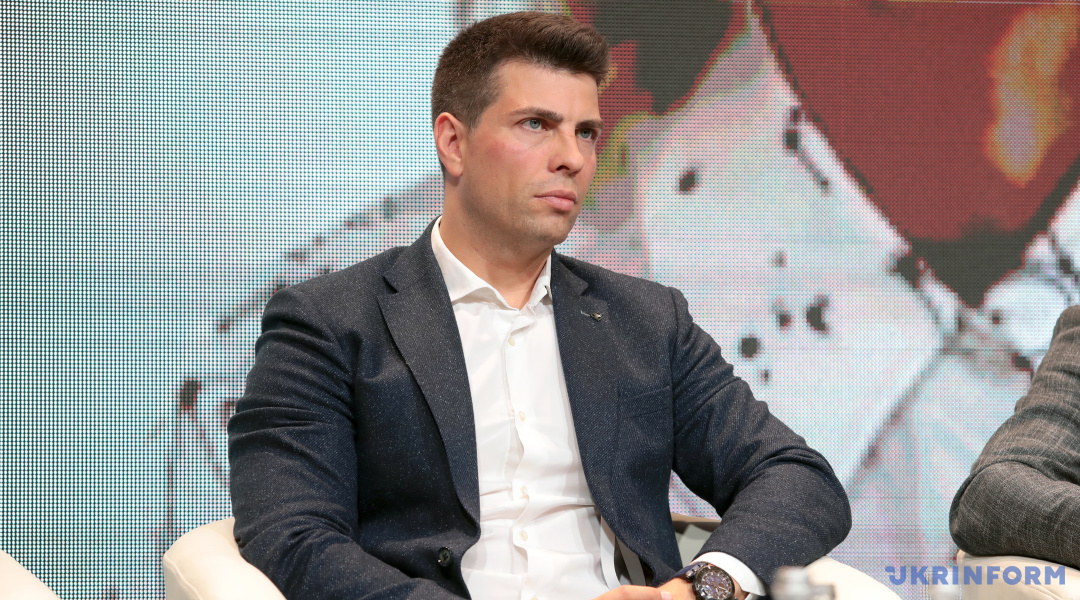
Commenting on the requirement to introduce a separate queue in the eCheck for cars with EU license plates, the official emphasized that "no EU country has a separate queue for Ukrainian drivers, and neither do we."
"Now we see vehicles from at least 40 countries in the eCheck system, and it is obviously not only the EU," added Mr. Derkach.
He also considers the Poles' demand to gain access to the Shlyakh system to be very strange, since it was created specifically for Ukrainian carriers and drivers.
Finally, as for the agreement between Ukraine and the European Union, according to which Ukrainian carriers drive without permits in the EU...
"The agreement on the liberalization of freight transportation, under which this is happening, is valid until the end of June 2024. And it is important to understand that the agreement is valid in both directions - that is, that our carriers travel without permits, and that European carriers travel to Ukraine under the same conditions. That is, it is simply impossible to cancel the agreement at the level of the Polish government," explained Sergiy Derkach.
So, the question arises: can blocking the border be the fulfillment of someone's political order?
The organizers of the "action", among whom the most active is 41-year-old Rafał Mekler from Lublin, owner of the transport company Rafał Mekler Transport, stubbornly claim that their action is without politics, that it is purely economic. But is it really so? We have our doubts.
Mekler is also known to be a representative of the branch of the pro-Russian party Confederation of Freedom and Independence, whose leader, Janusz Korwin-Mikke, has called for the recognition of the occupation of Crimea and visited the annexed peninsula in 2015.
Moreover, the Confederation of Freedom and Independence is linked to another right-wing Polish organization, All-Polish Youth, which has ties to the Russian Imperial Movement, which recruited terrorists for the so-called LDPR. Ziemowit Przebitkowski, the leader of the Confederation of Freedom and Independence's list in the 2023 Polish Sejm election campaign, is a former leader of the All-Polish Youth movement. The Confederation of Freedom and Independence and the All-Polish Youth organize joint events, such as the Eurosceptic Sovereignty March in 2019.
Since the beginning of Russia's invasion of Ukraine, Rafał Mekler Transport and other Polish companies such as Kam-Trans, Jata-Trans, BOR-TOM, GLT POLSKA, KMS LOGISTYKA, and PEO-TRANS have been holding actions demanding the lifting of anti-Russian sanctions.
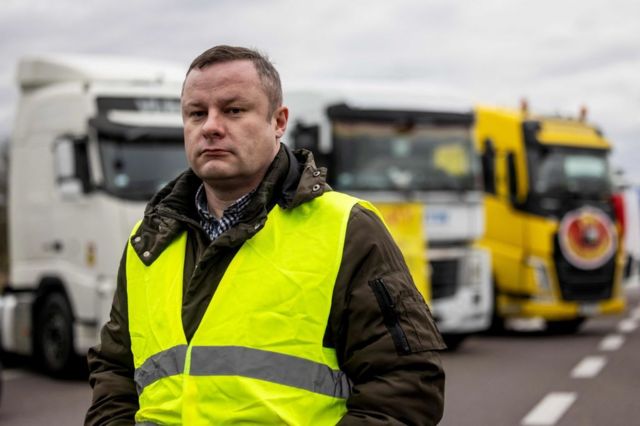
On November 16, the organizers of the rally met with Grzegorz Braun, co-founder of the Freedom and Independence Confederation party and leader of the Polish Crown Confederation, at the Polish border crossing point of Korczowa. Brown was the only member of the Polish Sejm who voted against the resolution condemning the events in Bucha. He takes a stance against Ukrainian migrants in Poland and is the author of the slogan "Let's stop the Ukrainization of Poland".
These are the people who are currently undermining the friendship between Poland and Ukraine, stating that they are ready to block the border at least until the end of the year.
Hence, we have even more questions: do the Polish special services, the president, and the current government not know about all this? Of course they are aware of it. But then why do they stand by and do nothing? Perhaps, then, the Ukrainian government or the European Commission can somehow move this situation forward?
Ukrinform asked the experts whether we should expect changes, and most importantly, what kind of changes could these be and when will they occur?
"Confederates" are practicing Russian "wooden" ones, so they don't really need any agreements
"This is a successful special operation of the Russian special services. It's hard to think of a cheaper way to quarrel Ukraine with Poland and cause billions of dollars in damage to our country. But what is surprising in this situation is not the blockade itself, but the inability of local and central authorities in Poland, as well as the inaction of the institutions of the European Union. After all, the bilateral agreement between the EU and Ukraine, which is part of the EU legal framework, is being violated," diplomat Vadym Triukhan commented to Ukrinform.
According to him, this case once again clearly demonstrates that democratic procedures are losing out to authoritarian methods of organizing chaos, which are skillfully used by the Russian Federation.
"By bribing a couple of dozen scumbags anywhere in Europe, and not only in Europe, Moscow is able to sow chaos and anarchy with huge losses for all parties involved," says Triukhan.
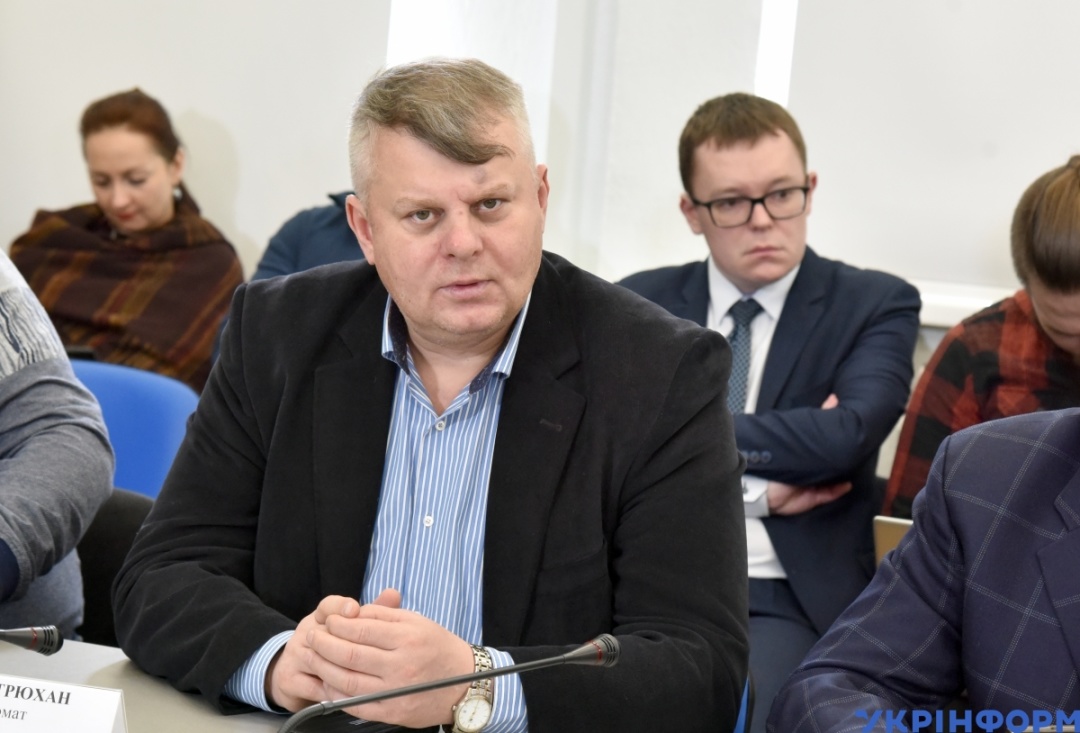
When asked why the Polish authorities and government withdrew themselves, the expert answered: "On the one hand, the current government is actually five minutes away from political retirement. And this can be seen as an unwillingness to get involved in history. However, besides the government, there are security forces. Two dozen special forces would be enough to stop this coven in half an hour. However, they are also ineffective. Most likely, both the political leadership of Poland and the heads of the special services, without collusion, decided to use this crisis at the border for future bargaining with the European Commission. And the latter, in turn, has been diligently pretending that nothing special is happening on the Ukrainian-Polish border. Probably not wanting to engage in a dialog with a government that is already "sitting on its hands and knees."
Could the emotional moment with the deaths of two Ukrainian drivers in the queue have an impact? Or the fact that this is a blow to the cargo for the Armed Forces of Ukraine? Vadym Triukhan thinks so: "The deaths of Ukrainian drivers are a black swan for everyone. If the Ukrainian side adequately draws attention to these tragedies, in particular in the information field, it is quite possible to force both the Polish side and European institutions to react."
In addition, the expert emphasizes, Washington's participation would be justified
"If the involvement of the Russians in organizing the blockade were brought to the public, the Polish security forces would no longer be able to afford to do nothing," the diplomat believes. Ukraine, according to the expert, is also not responding sufficiently.
"Where are the asymmetric retaliatory measures? Where is the investigation of Russian involvement? Where are the protests at the Polish embassy? There is no visible reaction. No practical steps to unblock the situation. One round of negotiations at the border? This could not have worked a priori, because the "confederates" are working out the Russian wooden rules, so they don't really need any agreements. Ukraine must finally learn to respond immediately to such and other hybrid crises inspired by racists."
The Russians will continue to look for weaknesses and hit them
"In fact, the crisis on the Ukrainian-Polish border is just the beginning," our interlocutor emphasizes.
"And the berries are still ahead... And to prevent them from turning into wolves, we should respond promptly to such situations.
However, the question remains: what to do? The diplomat says that, firstly, Presidents Zelensky and Duda should talk about this, secondly, the heads of the intelligence services should hold consultations to agree on joint actions to repel the encroachments of the Russian special services on both countries and their bilateral relations, thirdly, Washington's influence is very desirable, and fourthly, the European Commission should issue an invoice to Poland.
"And one more thing. Even when the government is changing, the state machine must work. It is quite obvious that such a "crisis" can be resolved in half an hour. But to do this, the Poles must remember what political will and professional honor of officers serving in the special services are," Vadym Triukhan believes.
Unblocking the border with Ukraine is possible only after the intervention of the US and the EU, as well as a meeting between Zelensky and Duda.
Political expert Yevhen Savisko recalls that relations between Ukraine and Poland began to deteriorate during the grain blockade this summer. And after the sharp "exchanges of views" between Presidents Volodymyr Zelensky and Andrzej Duda and Polish Prime Minister Mateusz Morawiecki in September, the situation was almost on the brink. The current blockade of the border with Ukraine by Polish carriers is a logical continuation of those scandals.
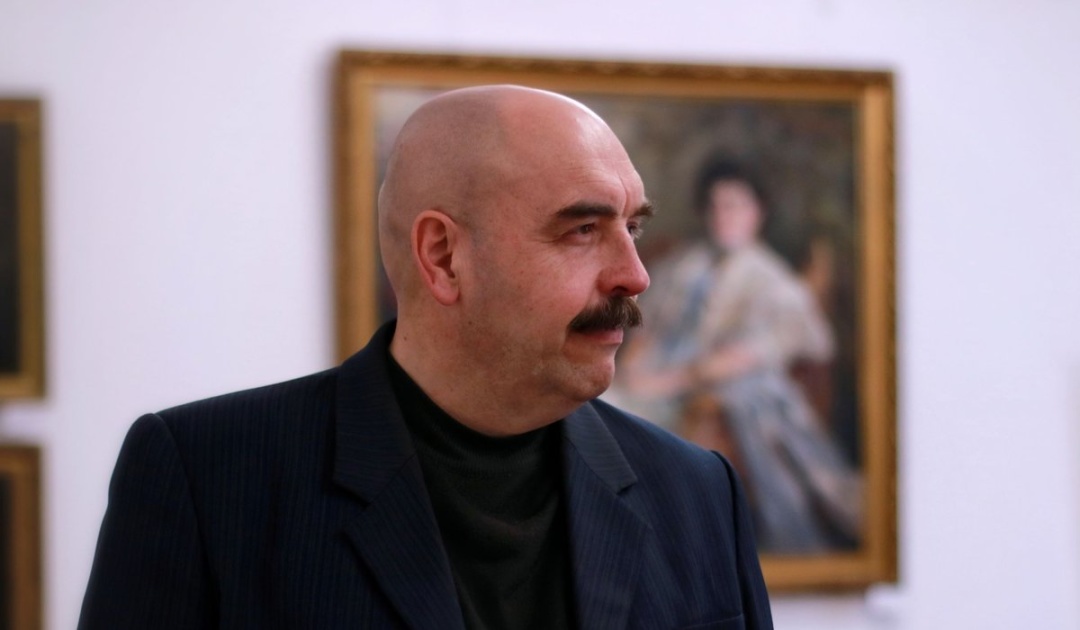
"There are three reasons for the current Polish demarche. The work of the Russian special services, which need to prevent the supply of aid from allies to Ukraine at any cost. It has long been no secret that the vast majority of European far-right and far-left parties and movements are funded by Russia. Therefore, it is not surprising that the blockade was organized and led by representatives of the Confederation party," the expert said.
The second reason is the political situation in Poland itself. First of all, the results of the recent parliamentary elections and the start of preparations for the presidential election in 2025.
"All potential candidates want to win the favor of voters, and any means will do. In particular, the support of local farmers, as well as the right-wing radical part of the electorate. The fact that Ukraine, which is fighting alone against a common enemy, may suffer from this is of little concern to anyone," Mr. Savisko says.
The third reason is that our government officials and security forces have failed to build a pro-Ukrainian network of influence in Poland, as well as in other neighboring countries. It is this network that should have countered Russian expansion both officially and unofficially.
"The unblocking of the border with Ukraine is possible after the intervention of the US and the EU. It is also necessary to develop and agree on an intergovernmental document that will spell out all the problematic issues between the two countries, ways to solve them, deadlines for implementation, obligations and guarantees of their fulfillment," the political scientist suggests.
It would also be desirable for the presidents of Poland and Ukraine to meet and publicly apologize for their harsh statements and announce their vision of the development of interstate relations without insults and accusations.
"It would be best if such an initiative came from the Ukrainian side. And it will be a gesture of strength, not weakness. After all, only the strong and wise are not afraid to admit their mistakes and miscalculations, and are ready to extend a hand of friendship to those who deserve it," emphasized Yevhen Savisko.
Polish special services need to take action to find out who is behind the border blockade
Yevhen Magda, Director of the Institute of World Policy, also believes that the situation on the Polish-Ukrainian border is an operation of Russian special services. And it is being carried out by the hands of individual Polish citizens in order to destabilize Polish-Ukrainian relations.
The expert is convinced that the initiators of this operation have clearly calculated the date of its start.
"Morawiecki's government is no longer able to make certain decisions, the Law and Justice party (PiS) lost the election to a coalition of opposition forces. And it is not interested in solving the problems it prefers to leave to its successors. And the new government, which will most likely be headed by the leader of the Civic Platform, Donald Tusk, has not yet been formed," the political scientist explains.
In this situation, we should get rid of illusions. We should not expect that Tusk and his government will primarily address the issue of unblocking the border with Ukraine.

"They will have many other questions, and they will have to take into account the factor of strong opposition from PiS," notes Yevhen Magda. "I think that the actions of Polish special services are needed to find out who is behind the organization of this blockade. And the Ukrainian government should convey its position to the Poles, explaining the importance of the normal functioning of the transport corridor, especially given that we continue to repel Russian aggression."
Myroslav Liskovych. Kyiv

